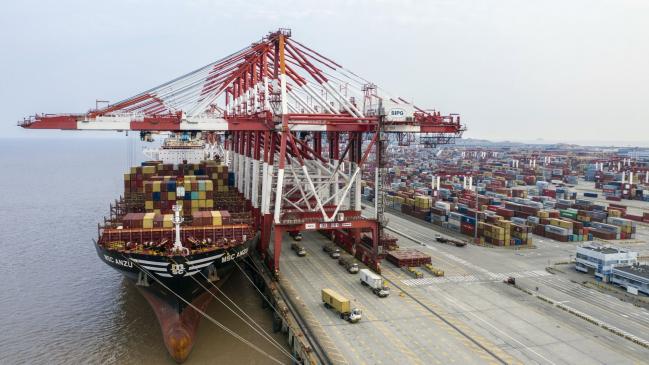(Bloomberg) -- U.S. and Chinese trade teams are discussing next steps after Presidents Donald Trump and Xi Jinping agreed to meet on the sidelines of the upcoming Group of 20 summit in Japan, a senior trade official said in Beijing.
The trade teams are working to implement the decision by the top leaders, Vice Commerce Minster Wang Shouwen told a news briefing Monday in Beijing. Wang provided no specifics on what communications have occurred between the two sides. “Compromise will be on both sides. It will be a two-way street," said Wang.
China’s principles for the trade talks remain the same, Wang said, including “mutual respect, treating each other as equals, win-win outcomes, working together and respecting the rules of the World Trade Organization.” He added that “mutual respect means respect for each other’s sovereignty.”
Trump and Xi planned to discuss a range of shared issues, Assistant Minister of Foreign Affairs Zhang Jun said at the briefing, which was intended to preview the Chinese president’s agenda for the G-20 summit. The annual multilateral event is scheduled to take place June 28-29.
Blocking Chinese companies including Huawei Technologies Co. from buying U.S. software and components harms the interests of Chinese and American firms, according to Wang, and restricting exports doesn’t help to balance trade. China hopes the U.S. will remove its companies from the entities list, Wang said.
Read: This Year’s G-20 Will Be a Faceoff Between Trump and Xi
The face-to-face meeting between the leaders of the world’s two largest economies will be closely watched, as markets anticipate an effort to cool mounting trade and security disputes. Talks broke down last month after Trump accused China of reneging on its commitments, increased tariffs on $200 billion of Chinese imports and threatened to target the remaining $300 billion with duties of as much as 25%.
One sticking point could be Hong Kong, with activists calling for a "G-20 Free Hong Kong rally" on Wednesday and pushing for the issue to be discussed at the summit. China won’t allow that to happen, Zhang said, adding that the meeting should focus on trade and finance.
Historic protests in the city over the past few weeks, including several that turned violent, prompted Chief Executive Carrie Lam to suspend a controversial bill that would allow extraditions to China. Protesters have since called for the legislation’s complete withdrawal and for Lam to resign. The events have embarrassed the central government in Beijing, which continues to back Lam’s administration.
Trump said earlier this month he was confident that Hong Kong and China will resolve their differences. “I hope it all works out for China and for Hong Kong,” the president said at the White House. “I’m sure they’ll be able to work it out.” Members of the U.S. Congress have reintroduced a measure defending Hong Kong’s autonomy.
“Hong Kong is a special administrative region of the People’s Republic of China. Hong Kong affairs are purely the internal affairs of China," Zhang said. "We do not allow any country or any individual to interfere in China’s internal affairs in any way."
To contact Bloomberg News staff for this story: Peter Martin in Beijing at pmartin138@bloomberg.net
To contact the editors responsible for this story: Brendan Scott at bscott66@bloomberg.net, Sharon Chen, Karen Leigh
©2019 Bloomberg L.P.
